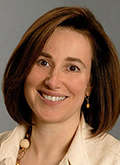Sigal Barsade, Management
 Sigal Goland Barsade, a pioneering researcher of social dynamics in office settings and the Joseph Frank Bernstein Professor in the Wharton School’s department of management, passed away on February 6 of complications from glioblastoma. She was 56.
Sigal Goland Barsade, a pioneering researcher of social dynamics in office settings and the Joseph Frank Bernstein Professor in the Wharton School’s department of management, passed away on February 6 of complications from glioblastoma. She was 56.
Born in Haifa, Israel, Dr. Barsade was the daughter of an engineer for Boeing and a software engineer. When she was 3, her family moved to Los Angeles, and Dr. Barsade spent most of her childhood in California. She graduated from the University of California, Los Angeles, in 1986 with a BA in psychology, then obtained a PhD in organizational behavior from the Haas School of Business at the University of California, Berkeley, in 1994. After graduating, she joined the faculty of Yale School of Management, first as an assistant professor, then as an associate professor. Dr. Barsade came to Penn in 2003 as an associate professor in management, then was promoted to full professor six years later. At Penn, she served on the Faculty Senate (chairing the Senate Committee on Faculty and the Administration from 2011 to 2012) and the University Council, and in 2020 was one of a lively cast of guest lecturers who taught a course about the economic impacts of COVID-19. In 2017 and 2020, she earned the Wharton School’s Excellence in Teaching Award. “Her ability to read the room stemmed from her use of what she studied in terms of emotional intelligence, and that helped her to be a better teacher,” said Wharton Deputy Dean Nancy Rothbard, a former colleague of Dr. Barsade. “She had incredibly high standards for scholarship, for education, for everything.”
While at Yale and Penn, Dr. Barsade conducted groundbreaking research that reframed emotions as a vital part of work-related human behavior. “For a long time, emotions were viewed as noise, a nuisance, something to be ignored,” she told MIT Sloan Management Review in 2020. “But one thing we now know after more than a quarter-century of research is that emotions are not noise—rather, they are data. They reveal not just how people feel, but also what they think and how they will behave.” She focused on emotional intelligence, organizational culture, unconscious bias, teamwork, leadership and organizational change, and published over 30 scholarly articles about her research. Her findings had a profound influence on office culture, for instance, that having a friend in the office boosts productivity, and that positive and negative emotions are contagious. She emphasized the importance of negative emotions as a catalyst for change, and contributed to what is now a widely-held view that even if an employee is perfectly qualified on paper, they might not match a workplace’s emotional culture. Dr. Barsade pioneered research on the affective revolution, which is the study of how emotions shape workplace culture and influence the performance of both individual employees and teams.
Dr. Barsade was renowned for her findings and for the quality of her research. “She was the epitome of a high-quality scientist,” said Angela Duckworth, Dr. Barsade’s former colleague at Wharton. “Everything she did was a gem.” She was renowned throughout the academic community. She served on the editorial boards of the Administrative Science Quarterly, Organizational Behavior and Human Decision Processes, and Organization Science, and held several administrative positions with the Academy of Management during the 2010s. Dr. Barsade was a sought-after consultant and worked with high-profile firms like Coca Cola, Google, Comcast, Office Depot, Penske, and the NBA to help foster a friendly and productive workplace environment. Her work was often cited in mainstream media, and in 2021, she led a task force to harness behavioral science to try to boost vaccination rates.
“Sigal’s contributions to academia and the business world cannot be overstated. She encouraged business leaders to think differently and widen their beliefs about what matters in the workplace,” said Wharton Dean Erika James in an online tribute. “She touched so many lives during her nearly two decades at Wharton, and she is dearly missed.”
Dr. Barsade is survived by her husband, Jonathan; her parents; her brother, Yaron; her daughters, Sivahn and Maayan; and her son, Itai.
--
To Report A Death
Almanac appreciates being informed of the deaths of current and former faculty and staff members, students and other members of the University community. Call (215) 898-5274 or email almanac@upenn.edu.
However, notices of alumni deaths should be directed to the Alumni Records Office at Suite 300, 2929 Walnut St., Philadelphia, PA, (215) 898-8136 or record@ben.dev.upenn.edu.
